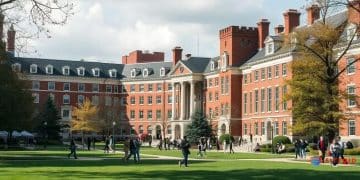Harvard federal funding freeze raises concerns among researchers
Anúncios
The Harvard federal funding freeze significantly impacts research quality and timelines, prompting universities to explore diverse funding strategies and alternative revenue sources to maintain academic progress.
The Harvard federal funding freeze has sparked numerous discussions about its potential impact on vital research initiatives. Researchers are understandably concerned about how this may influence their projects and the academic landscape at large.
Understanding the implications of the funding freeze
Understanding the implications of the funding freeze at Harvard is crucial for both researchers and students. It affects not only individual projects but also the larger academic community. This situation raises questions about the future of research initiatives that rely on federal support.
Anúncios
Impact on Research Projects
The immediate effect of the funding freeze is seen in ongoing research projects. Scholars every day are faced with challenges as grants are put on hold. Some projects may even be delayed or canceled altogether due to the lack of funding.
- Disruption of project timelines
- Inability to hire research assistants
- Potential for lost data and findings
Moreover, this freeze could slow down progress in critical areas. For example, research regarding public health, environmental science, and educational methods could be stalled indefinitely. Such delays might hinder advancements that can benefit society.
Anúncios
Broader Consequences
Beyond individual impacts, a funding freeze can have broader consequences for the academic environment. Students may find fewer opportunities for internships or research participation due to project limitations. This can affect their educational experience, making it less hands-on.
Additionally, faculty members may feel the strain as their research goals become more challenging to achieve. As they adapt to these changes, they might need to seek alternative funding sources. This can lead to increased competition among universities and researchers.
- Shifts in academic hiring practices
- Changes in focus areas for research
- Increased reliance on private funding
Thus, the funding freeze serves as a wake-up call for the academic community. Universities must consider new strategies to secure funding more reliably. Exploring diverse funding avenues, such as collaborations with private sectors, could become essential.
In summary, the implications of the funding freeze are far-reaching. Adjustments are needed not just at the project level but also in the wider academic framework to navigate these challenges successfully.
Impact on ongoing research projects

The impact of the funding freeze on ongoing research projects at Harvard is significant and far-reaching. Many researchers now face delays, and the progress of vital studies could be at risk. Adapting to this new reality presents challenges that require immediate attention.
Delays in Timelines
Ongoing projects are experiencing unexpected delays. Researchers find themselves in a holding pattern while waiting for funding decisions. This uncertainty can lead to frustration and complications.
- Researchers may miss important deadlines.
- Data collection efforts could be abruptly halted.
- Publications might be postponed due to incomplete studies.
These delays not only affect individual researchers but also have a ripple effect on teams and departments. Collaboration becomes tricky as team members may have to adjust their schedules and expectations. It disrupts the flow of work that is crucial for innovation.
Inability to Hire Staff
Another significant impact stems from an inability to hire essential staff. With projects stalled, funding that supports researchers and assistants is suddenly unavailable. This loss can have devastating effects on ongoing research efforts.
- Graduate students may lose opportunities to gain valuable experience.
- Research assistants might seek positions elsewhere due to uncertainty.
- Teams could become overworked, leading to burnout.
Such staffing shortages can lead to project abandonment or incomplete findings. As researchers scramble to fill gaps, quality and innovation may suffer. Maintaining momentum becomes a daily struggle against stagnation.
In summary, the impact on ongoing research projects is multifaceted, involving delays and staffing challenges that could hinder progress in crucial fields. Addressing these issues will require strategic planning and collaboration from the academic community.
Responses from the academic community
The responses from the academic community regarding the funding freeze at Harvard have been varied and insightful. Many researchers share their concerns and ideas about how to navigate this challenging situation. Collaboration and communication appear to be vital themes in these discussions.
Concerns Over Research Viability
One major response focuses on the viability of ongoing research. Scholars express fears that important studies may come to a halt due to funding issues. This not only affects their current work but also has potential long-term implications for their fields.
- Loss of research continuity could lead to critical gaps in knowledge.
- Researchers worry about their ability to secure future grants.
- Collaborative projects become uncertain, impacting multiple teams.
Many academics have voiced the urgency of addressing these concerns together. By sharing resources and strategies, they hope to find pathways to move forward despite the funding freeze. Communication among colleagues and within institutions is essential during this time.
| Affected Area | Immediate Effect | Long-Term Implication |
|---|---|---|
| Research Projects | Ongoing studies suspended | Delays in scientific breakthroughs |
| Staffing | Inability to hire research assistants | Academic workforce reduction |
| Students | Fewer research participation opportunities | Less practical learning experiences |
| Alternative Funding | Increased search for private partnerships | Greater dependence on non-federal sources |
| Academic Reputation | Concerns over research continuity | Potential decline in innovation leadership |
Calls for Alternative Funding Sources
Another common response is the call for exploring alternative funding sources. Academics are urging institutions to look beyond traditional federal funding to sustain research initiatives. They recognize that relying solely on government grants can be risky.
- Partnerships with private organizations may offer new opportunities.
- Crowdfunding could be a viable option for certain projects.
- Institutions are encouraged to invest in fundraising efforts.
These discussions highlight the resilience of the academic community. Researchers are willing to adapt to the changing landscape and seek innovative solutions. Their dedication to advancing knowledge remains strong, even in challenging times.
As the situation unfolds, the impact of collective responses will likely shape the future of academic research at Harvard and beyond.
Potential long-term effects

The potential long-term effects of the funding freeze at Harvard can significantly reshape the academic landscape. As researchers grapple with immediate challenges, the broader implications may impact education, innovation, and public trust in research.
Impact on Research Quality
One of the foremost concerns is the impact on research quality. With funding on hold, researchers may struggle to maintain the standards required for impactful studies. This can lead to fewer groundbreaking discoveries.
- In-depth studies could be compromised due to resource shortages.
- Funding constraints may limit collaborative efforts between departments.
- Rapid research could replace thorough investigations, jeopardizing findings.
When quality diminishes, it affects not just the immediate community but public perception of academic research as a whole. Society relies on robust studies to drive policy and innovation.
Changes in Academic Workforce
The funding freeze may also lead to long-term changes in the academic workforce. Positions that would typically be supported through grants might disappear, affecting job stability and research opportunities.
- Reduced hiring could lead to an aging professoriate.
- Young scholars might turn to other fields for job security.
- Institutions might start favoring positions with guaranteed funding.
This shift can hinder fresh ideas and perspectives from entering academia, limiting innovation and diversity of thought. Young researchers often bring a new vibrancy necessary for academic growth.
Another aspect to consider is the broader societal impact. If the academic community struggles to produce high-quality research, public dependence on data-driven decision-making may be compromised. Overall, the potential long-term effects of this funding freeze extend well beyond immediate project delays, influencing both the future of research and the trust placed in academic institutions.
Future funding strategies for universities
Future funding strategies for universities need to evolve in response to the recent funding freeze issues faced, particularly at Harvard. As traditional funding sources become less reliable, it is crucial for institutions to adapt and explore innovative solutions.
Exploring Diverse Revenue Streams
One promising strategy is to explore diverse revenue streams. Universities can no longer rely solely on federal grants; they must look for alternative funding avenues to ensure stability. This opens up possibilities for partnerships and collaborations.
- Forming alliances with private sector companies can provide essential support.
- Engaging alumni for donations can boost financial resources significantly.
- Crowdfunding campaigns targeting specific projects can also gather small donations from many supporters.
Each of these strategies offers a unique way to generate income while fostering community engagement and involvement. As universities innovate, they can maintain their research momentum even in challenging times.
Investing in Research and Development
Investing in research and development (R&D) is another potential funding strategy. By allocating internal resources to R&D, universities can promote their own projects and attract external funding. This proactive approach can set institutions apart.
- Establishing incubation centers can support emerging ideas and startups.
- Providing seed funding to promising faculty projects can result in larger grants down the line.
- Creating attractive environments for researchers can help lure top talent.
This strategy not only encourages innovation but also demonstrates a commitment to pushing boundaries in various fields. Universities that prioritize R&D will position themselves for success in securing future funding.
Overall, the future funding strategies for universities will require a mix of creativity, collaboration, and foresight. By diversifying revenue sources and investing in R&D, universities can navigate challenges while continuing to contribute valuable research and education.
In conclusion, understanding the implications of the funding freeze
This funding freeze at Harvard has far-reaching effects, impacting ongoing research projects and the academic community as a whole. Researchers express concerns about the viability of their studies and seek alternative funding sources.
As they navigate these challenges, the calls for collaboration and innovative funding strategies are paramount. Exploring diverse revenue streams and investing in research can provide universities with the tools they need to adapt.
Moreover, addressing the potential long-term consequences will be essential for maintaining the quality and integrity of academic research. By staying proactive and engaged, universities can ensure that they continue to thrive amid uncertainty.
FAQ – Frequently Asked Questions about the Harvard Funding Freeze
What is the impact of the funding freeze on ongoing research projects?
The funding freeze can lead to delays, reduced quality of research, and potential cancellations of projects, ultimately affecting academic progress.
How can universities generate alternative funding sources?
Universities can explore partnerships with private companies, engage alumni for donations, and initiate crowdfunding campaigns for specific projects.
What long-term effects could the funding freeze have on the academic workforce?
The freeze may result in staff reductions and create a less diverse academic workforce, which can hinder innovation and fresh ideas from emerging scholars.
What strategies can universities adopt to ensure future funding success?
Investing in research and development, diversifying revenue streams, and fostering collaboration within the academic community can help ensure future funding.





